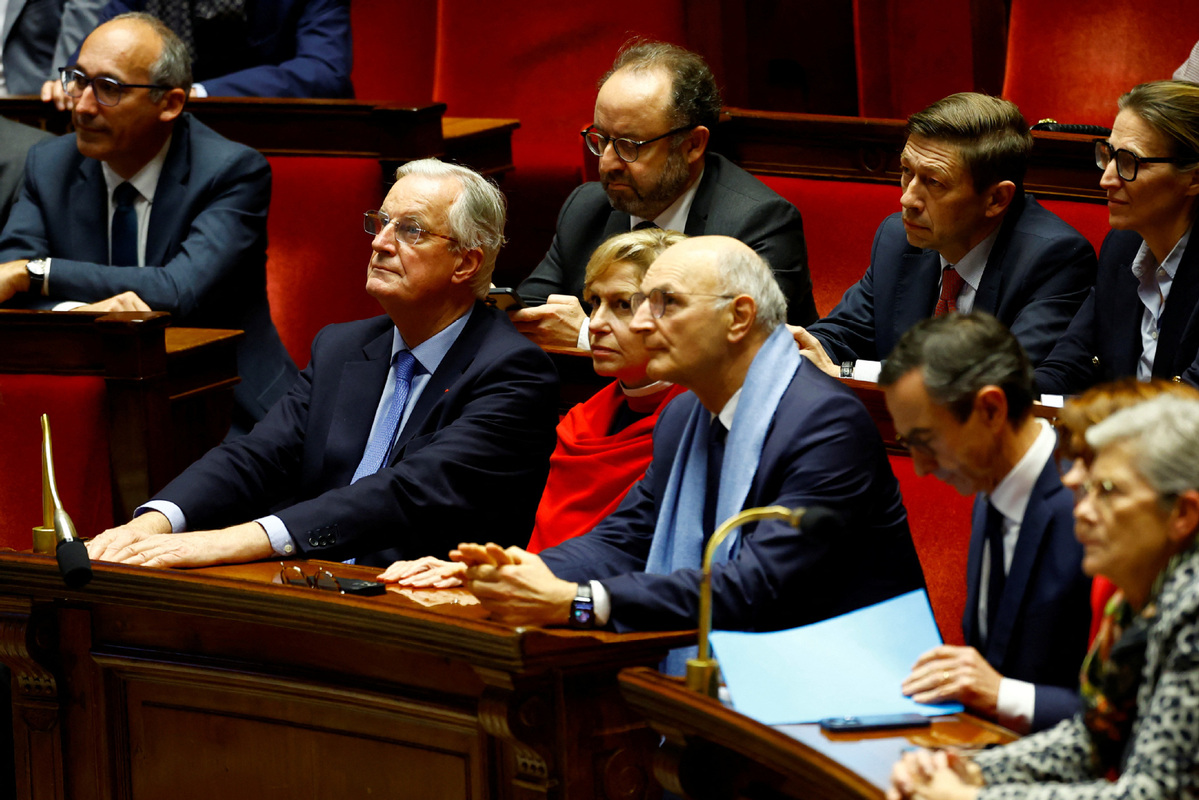French political crisis deepens as PM resigns
No-confidence vote topples govt, leaves Macron to name successor amid turmoil
By MOHAMMAD ARIF ULLAH in Paris | China Daily Global | Updated: 2024-12-06 09:10

French Prime Minister Michel Barnier has stepped down following a no-confidence vote in parliament, ending his government's three-month tenure.
The motion, supported by 331 of 577 members of the National Assembly, made Barnier the shortest-serving prime minister in modern France's history.
"The prime minister today submitted the resignation of his government" to President Emmanuel Macron, who has "taken note" of the resignation, the Elysee said on Thursday. Barnier and his ministers remain "in charge of daily business until the appointment of a new government", it added.
Macron, who returned early from a state visit to Saudi Arabia, was set to address the nation at 8 pm on Thursday, with the country facing political and economic uncertainty.
The vote came after fierce opposition to the government's austerity-driven social security budget. Barnier had invoked executive powers to pass the budget without parliamentary approval, sparking outrage from both the radical left and the far right. Together, these unlikely allies secured enough votes to topple the government.
The political chaos reflects the challenges of governing a hung parliament, a result of a snap election in the summer that left no party with a clear majority.
Marine Le Pen, leader of the far-right National Rally, justified her support for the no-confidence motion by calling the budget "technocratic" and harmful to ordinary citizens. She said during the debates, "The worst policy is to allow this government to stay."
Hard-left lawmaker Eric Coquerel described the vote as "the death knell of Emmanuel Macron's mandate". "This is not just about the government's failure. It is about a president who has become an obstacle to solutions for France," he added.
Conservative leader Laurent Wauquiez, whose members of parliament abstained, accused both extremes of destabilizing the country. "This will plunge France into greater instability, and we must hold the far right and radical left responsible," he said.
The vote marked the first successful no-confidence motion to oust a French government since 1962. Political analyst Roland Cayrol told France 5 TV: "This collapse was predictable. There was no unity, no shared vision — just a prime minister placed in an impossible situation."
Meanwhile, Macron faces mounting pressure to resign, with opposition figures calling for immediate presidential elections. Mathilde Panot, leader of the radical-left LFI party, said on Thursday: "Macron should go. His presidency is a barrier to progress." Panot warned that her faction would block any future government not aligned with her party.
Macron now faces the challenge of appointing a successor who can navigate the fractured political landscape. National Assembly President Yael Braun-Pivet urged him to act quickly to avoid "prolonging the crisis". However, finding a leader who can command parliamentary support may prove difficult.
"We are witnessing the decline of stable governments in France," political scientist Pascal Perrineau told France 2 TV on Wednesday. "Without a parliamentary majority, future administrations will be weak and vulnerable to similar motions."
Investor confidence
Macron's government is also under pressure from financial markets. Analysts warn that prolonged instability could undermine investor confidence in France's ability to implement key fiscal reforms.
Despite calls for him to step down, Macron has rejected the idea, dismissing it as "political fiction" earlier this week. His national address was expected to outline steps for restoring stability, though details remain unclear.
Barnier's resignation underscores the fragility of Macron's administration, experts said. Elected without a parliamentary majority, his government has relied on tenuous alliances to pass legislation, a strategy that now appears unsustainable.
This historic moment has left France's political landscape in disarray. As Macron prepares to name a new prime minister, he must navigate a parliament where mistrust runs deep and opposition factions remain emboldened.
The writer is a freelance journalist for China Daily.
























